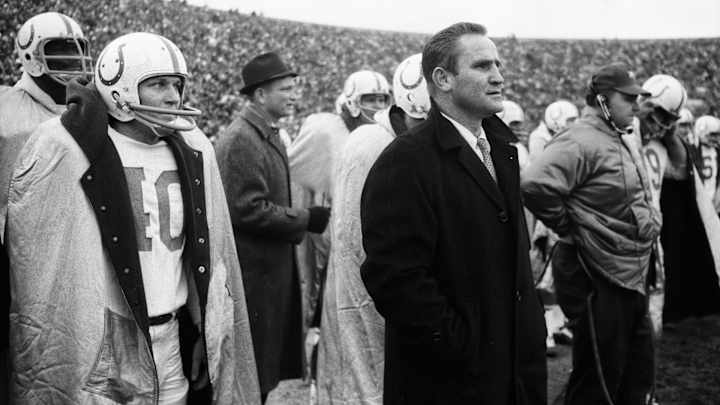Don Shula’s Twilight Years

Don Shula once broke his famous jaw in a game, when he was a cornerback for the Baltimore Colts, and didn’t realize it until he went out to dinner that night and couldn’t chew the ground beef. He was notoriously demanding as a coach, too, requiring his Dolphins teams to practice four times a day without water. In his final years, his presence diminished with his health, but his legacy became even stronger.
Monday morning, the Dolphins announced that the legendary coach, the NFL’s winningest, had died peacefully at home at age 90.
Shula was slower, weaker, in the last years of his life. There was the scare in 2011, when a blood clot moved through his heart and lungs. He was hospitalized in 2016 due to fluid retention and sleep apnea. When he made public appearances, like the much-delayed White House ceremony for the perfect ’72 team, or watching his son Mike coach the Panthers offense in Super Bowl 50, he rode his ubiquitous motorized scooter.
But Shula also carried a sense of peace with him in his twilight. His Indian Creek home was filled with the relics of a career defined by winning: replicas of his two Super Bowl trophies; photographs with Presidents Nixon, Ford, Clinton; 32 seasons’ worth of game plans neatly filed away in cabinets at home (the game plans from the 33rd season, the perfect one, were kept in a safe). He’d passed the stage when he could still play with his young grandchildren and great-grandchildren, but they were all celebrated with game balls announcing their births adorning his home office.
“He’s happy, he’s fulfilled, he’s done the things he wants to do and he’s enjoying every minute of his life,” his wife, Mary Anne, said during a visit to their home in 2013. “He is a very spiritual man, and he’s at peace with the world.”
In a way, Shula was his own time capsule for the ever-growing remarkability of his coaching achievements. Each year that he aged was another year that his marks of 347 career wins and the NFL’s only perfect season were not matched. He may have coached in a different era, but the guiding principles upon which he achieved his success are timeless. From that visit in 2013…
• On how he led his team: “I played seven years, and I always knew how I wanted to be treated as a player, so when I became a guy in charge, I wanted to make sure I treated my players the way I wanted to be treated when I was a player: hard work, have fun and compete and win.”
• On finding different ways to win: “That’s what I think coaching is all about, is analyzing the talent that you have to work with and then putting them in a position where they get the most out of their talent. And a great example is Bob Griese and Dan Marino. Griese was a field general, a thinking man’s QB, and if we threw it 8 or 10 times in a game, that was a lot for Griese. He’d hand the ball off to Larry Csonka or Mercury Morris or Jim Kiick and then he’d throw to [Paul] Warfield, play-action to Warfield. Then when we got Marino, we handed it off occasionally, but he wanted to throw it on every down. When I talk about Marino, I in my mind talk about him being the best pure passer that’s ever played the game.”
• On learning from the Super Bowl III loss to the Jets: “When it happened, it was a disaster, because we had won the first three Super Bowls, the old league had, and this was the first time that the team from the new league beat an established team. And [Joe] Namath talked about winning and then he won; he said, ‘I guarantee it.’ Remember that? So that was hard to live with and overcome, and people still occasionally bring it up. That’s funny how things like that just lead to other things. Accomplishments, the perfect season, then back-to-back Super Bowl wins, then career wins, all those things. Positive things that occur.”
The one question Shula would not give a direct answer on was if he was the greatest coach of all-time. “You make the decision,” he said from a comfortable chair in his home, with a view out onto Biscayne Bay and downtown Miami. “Let me tell you how it works. Two teams play each other. One team wins and one team loses. Who is the better team?”
It was the answer of a man who did not want wins to be the only measure of his career but who also was fiercely proud of all 347 wins and everything it took to earn them. It was the answer of a man who was at peace.
• Question or comment? Email us.
